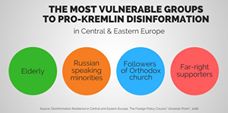The UK’s most senior representative in the European commission has set out a Brussels plan to crack down on disinformation campaigns executed by Russia and non-state actors, which he suggests were deployed during the 2016 Brexit referendum. Sir Julian King, the commissioner for security in Brussels, warned in a speech that it has become too easy for those seeking to manipulate elections, democratic processes and institutions, the Guardian reports:
The commission is proposing a series of measures to counter behavioral manipulation and fake news, including an obligation on internet platforms to demand greater transparency from those who use them to micro-target messages at individuals. ….{And] seeking to win round member states’ efforts to tackle a “much more subtle and pernicious” attempt to undermine democracies, through the use of social media as a “weapon of mass disinformation – a WMD for the modern age,” King said.
 In his view, this can take three forms:
In his view, this can take three forms:
- hacks and leaks designed to change public opinion by revealing damaging information at a crucial point during a campaign;
- the use of fake news to sway public opinion and influence results; and
- the misuse of targeted messaging based on psychometrics derived from mined user personality trait data – or Cambridge Analytica for short.
 Authoritarian states like China and Russia are utilizing considerable resources and exploiting the current dysfunctionalities in Western democracies to undermine liberal norms and institutions through the projection of “sharp power,” analysts suggest.
Authoritarian states like China and Russia are utilizing considerable resources and exploiting the current dysfunctionalities in Western democracies to undermine liberal norms and institutions through the projection of “sharp power,” analysts suggest.
Wealth and consistency have combined to yield an increasingly impressive soft-power portfolio along with the hard-power one, enabling China to make inroads into its opponent’s turf, argues Stephen Kotkin, Professor in History and International Affairs at Princeton University and a Senior Fellow at Stanford’s Hoover Institution. Strong countries with distinctive ideologies generally try to proselytize, and converts generally flock to a winner, he writes for Foreign Affairs:
So it should hardly be surprising that democracy, the rule of law, and other American values became globally popular during the postwar years, given the power of the U.S. example (even in spite of the fact that U.S. ideals were often more honored in the breach than the observance). But now, as U.S. relative power has diminished and the U.S. brand has run into trouble, the fragility of a system dependent on the might, competency, and image of the United States has been exposed.
“Meanwhile, as China has been powering forward largely against expectations, the United States and other advanced democracies have fallen into domestic dysfunction, calling their future power into question,” Kotkin adds. RTWT
China is emulating Russia on political interference tactics, according to former Obama administration officials who cautioned President Trump on Wednesday to learn from their mistakes and respond forcefully to Russian interference, the Washington Post reports.

RFE/RL
“The Russians, and particularly this Kremlin, watch what we do more than what we say — so active deterrence measures would have perhaps been more effective,” former assistant secretary of state Victoria Nuland (left) told the Senate Intelligence Committee. “We know that they may very well do this again, so now we need to be planning what the retaliation will be — and we need to be signaling it.”
Michael Daniel, cybersecurity coordinator at the National Security Council during the Obama administration including the time period of the 2016 campaign, joined Nuland – a board member of the National Endowment for Democracy, the Washington-based democracy assistance group – before the Senate panel, NPR adds.
 “Our adversaries are also going to get better at integrating their cyber-capabilities with other aspects of their national power. The Russians are already quite far along with that but the Chinese and others are not far behind,” Daniel said. “The Russians and other actors, including China, Iran, North Korea, criminal organizations, terrorist organizations, hacktivists, all of them are discovering the cyberspace is a great place to try to advance their agenda. We are seeing a proliferation of capabilities across the globe.”
“Our adversaries are also going to get better at integrating their cyber-capabilities with other aspects of their national power. The Russians are already quite far along with that but the Chinese and others are not far behind,” Daniel said. “The Russians and other actors, including China, Iran, North Korea, criminal organizations, terrorist organizations, hacktivists, all of them are discovering the cyberspace is a great place to try to advance their agenda. We are seeing a proliferation of capabilities across the globe.”
Research has identified three types of bias that make the social media ecosystem vulnerable to both intentional and accidental misinformation, Nieman Lab reports. That is why the Observatory on Social Media (above) at Indiana University is building tools to help people become aware of these biases and protect themselves from outside influences designed to exploit them.







